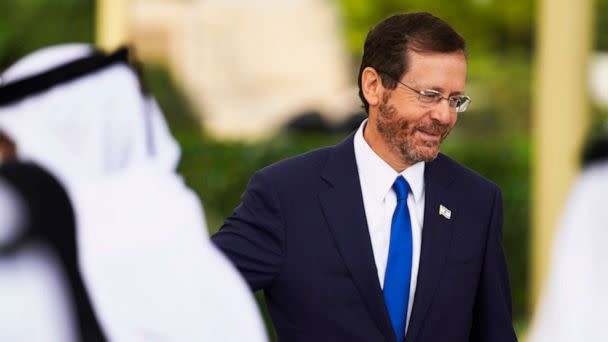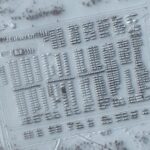While Israeli’s president Isaac Herzog was in Abu Dhabi on a historic visit on Monday, United Arab Emirates officials announced that a ballistic missile fired by Yemen’s Houthi rebels had been intercepted, the third such attack in three weeks.
Tensions between the two countries have escalated as the Iran-backed Houthis claimed responsibility for a Jan. 15 drone-and-missile attack on the Abu Dhabi National Oil Co. fuel depot, killing three people and wounding six. It was the first deadly attack since 2018, when the UAE-backed forces were fighting the Houthis for control of the Red Sea port city of Hodeidah.
“The operation led to a large number of death and wounded, including Emiratis,” Yahya Sare’e, spokesman of the Houthis, tweeted on Tuesday.
A Saudi-led coalition retaliated the day after with an airstrike on Yemen, killing about 80 people.
In 2020, the UAE and Bahrain signed U.S.-brokered normalization agreements with Israel, known as the “Abraham Accords.” Iran and its regional allies, including the Houthis, were among their shared security concerns. Iran, meanwhile, denounced any normalization of relations with Israel.


“The Islamic republic of Iran not only condemns what some countries are doing aiming at normalization, but also believes that those countries should listen to awakening calls by their own people and stop sowing discord in the Muslim and Arab world. This will be much better for the region’s future,” spokesman of Iran’s foreign ministry Saeed Khatibzadeh said on Monday, according to the Tasnim News Agency.
Yemeni minister of information Dhaif Allah Al-Shami, also made clear his country’s similar stance.
“Every country has its own way of welcoming the leaders of the Zionist entity [Israel], and we in Yemen have only done our duty,” he said on Twitter.
Zakaria Al-Qaq, an expert in national security and war studies, told ABC News the Houthi attack on the UAE coinciding with the Israeli president’s visit had a clear message: “To stop the UAE intervention in Yemen.”
“Second, it’s not only a rejection to the Israel Emirates relation but also a threat to Yemeni National Security, because [of] the security coordination between the two countries,” he added.
Houthis have declared they would continue to fire rockets into the UAE.
“The armed forces affirm that the state of the Emirati enemy will be an unsafe as long as the tools of the Israeli enemy in Abu Dhabi and Dubai continue to launch aggression against our people and our country,” Sare’e wrote in another tweet.
MORE: US military fired missiles during Yemen Houthi attack on UAE
The Houthi spokesman has also repeated threats, telling citizens, residents and companies in the UAE “to stay away from vital headquarters and facilities, as they are vulnerable to targeting during the coming period.”
People in the already war-worn Yemen have been going through a difficult humanitarian situation over the past years. The World Food Programme has warned that more than five million people are on the verge of famine, with 50,000 others now living in famine-like conditions.
The spate of recent attacks have helped raise crude oil prices above $90 per barrel, another worry for a global economy already struggling through the pandemic.
Houthi missile intercepted by UAE during historic Israeli visit raises tensions originally appeared on abcnews.go.com




